Best cars for towing RVs? It’s a question that every RV enthusiast asks at some point. Whether you’re a seasoned pro or just starting out, choosing the right vehicle for towing your RV is crucial for a safe and enjoyable experience.
This comprehensive guide will help you navigate the ins and outs of selecting the best cars for towing RVs, ensuring you have the power, capacity, and features to handle the job.
From understanding towing capacity and payload to exploring engine power and transmission options, we’ll cover everything you need to know. We’ll also delve into safety features, comfort considerations, and fuel efficiency to help you make an informed decision. So, buckle up and get ready to find the perfect car for your RV adventures.
Towing Capacity
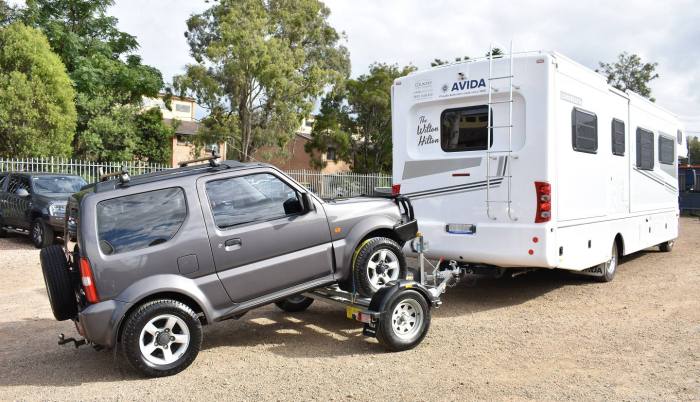
Towing capacity is crucial when selecting a vehicle for towing RVs. It determines the maximum weight your vehicle can safely tow. Exceeding the towing capacity can put undue stress on your vehicle’s engine, transmission, and brakes, potentially leading to breakdowns or accidents.
Exceptional Towing Capacity Vehicles
Vehicles with exceptional towing capacities include:
- Ford F-450 Super Duty: 37,000 lbs.
- Ram 3500: 37,100 lbs.
- Chevrolet Silverado 3500HD: 36,000 lbs.
- GMC Sierra 3500HD: 36,000 lbs.
- Dodge Ram 2500: 19,000 lbs.
Payload Capacity
Payload capacity is crucial for towing RVs, as it determines the combined weight of the RV and its cargo that the vehicle can safely handle. Exceeding the payload capacity can compromise stability, handling, and braking performance.
To calculate the combined weight, add the dry weight of the RV, the weight of passengers, and the weight of any cargo or equipment you plan to carry. Ensure that the total weight does not exceed the vehicle’s payload capacity.
Tips for Calculating Combined Weight
- Check the RV’s owner’s manual for its dry weight.
- Estimate the weight of passengers and cargo based on their average weight and the number of people or items.
- Consider the weight of any additional equipment, such as generators, propane tanks, or bike racks.
- Use a weight distribution hitch to distribute weight evenly and improve stability.
Engine Power and Torque: Best Cars For Towing RVs
When towing RVs, engine power and torque play crucial roles in determining the vehicle’s towing capabilities. Power, measured in horsepower (hp), indicates the engine’s ability to perform work, while torque, measured in pound-feet (lb-ft), represents its rotational force.
For towing heavy loads, vehicles with engines optimized for high torque are preferred. This is because torque directly affects the vehicle’s pulling power, allowing it to accelerate and maintain speed even when towing a heavy trailer.
Diesel Engines
Diesel engines are renowned for their high torque output, making them ideal for towing large RVs. They produce more torque at lower RPMs, providing ample pulling power even at slower speeds.
Gasoline Engines
Gasoline engines, while generally having lower torque than diesel engines, can still be suitable for towing lighter RVs. However, it’s important to consider the specific engine specifications and towing capacity of the vehicle.
Transmission Type
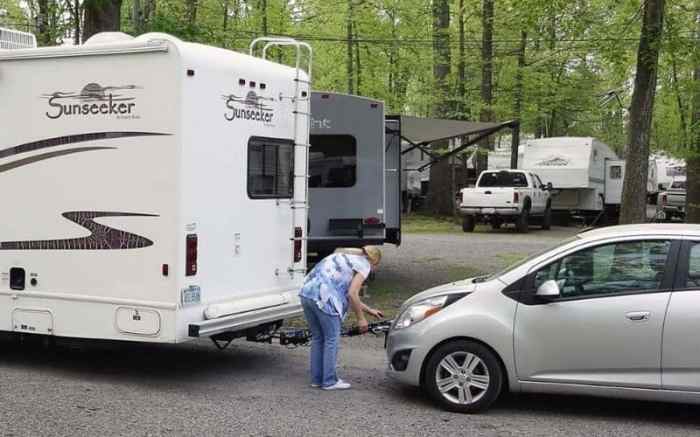
When it comes to towing RVs, the choice between automatic and manual transmissions is a crucial one. Each type offers unique advantages and drawbacks that can significantly impact your towing experience.
Automatic transmissions are popular for their ease of use and convenience. They automatically shift gears based on engine speed and load, eliminating the need for manual shifting. This can be particularly beneficial when towing heavy RVs, as it reduces the driver’s workload and allows them to focus on the road.
Advantages of Automatic Transmissions for Towing RVs:
- Ease of use: No need for manual shifting, reducing driver fatigue.
- Smoother shifting: Automatic transmissions provide smooth gear transitions, reducing jolts and improving towing comfort.
- Improved fuel economy: Modern automatic transmissions are designed to optimize fuel efficiency, especially when towing.
However, automatic transmissions also have some drawbacks for towing RVs:
Disadvantages of Automatic Transmissions for Towing RVs:
- Less control: Automatic transmissions limit the driver’s control over gear selection, which can be disadvantageous in certain towing situations.
- Potential for overheating: Automatic transmissions can overheat when towing heavy loads for extended periods.
- Higher maintenance costs: Automatic transmissions generally require more maintenance and repairs compared to manual transmissions.
On the other hand, manual transmissions offer greater control and durability for towing RVs.
Manual transmissions require the driver to manually shift gears using a clutch pedal. This provides greater control over the vehicle’s speed and torque, allowing the driver to select the optimal gear for towing conditions.
Advantages of Manual Transmissions for Towing RVs:
- Greater control: Manual transmissions allow the driver to select the appropriate gear for specific towing situations, improving performance and safety.
- Improved engine braking: Manual transmissions provide better engine braking, which can be beneficial when descending steep grades while towing.
- Lower maintenance costs: Manual transmissions generally require less maintenance and repairs compared to automatic transmissions.
However, manual transmissions also have some disadvantages for towing RVs:
Disadvantages of Manual Transmissions for Towing RVs:
- More difficult to operate: Manual transmissions require more skill and effort to operate, which can be challenging for inexperienced drivers.
- Less convenient: Manual transmissions require the driver to shift gears manually, which can be tiring and inconvenient, especially during long towing trips.
- Potential for clutch wear: The clutch in a manual transmission can wear out prematurely if not properly used when towing heavy loads.
Ultimately, the best transmission type for towing RVs depends on your individual needs and preferences. If you prioritize ease of use and convenience, an automatic transmission may be the better choice. However, if you desire greater control and durability, a manual transmission may be the more suitable option.
Frame and Suspension
When towing RVs, a robust frame and suspension are crucial for maintaining stability, handling, and safety. The frame provides the structural support to handle the additional weight and stresses of towing, while the suspension system absorbs shocks and vibrations, ensuring a smooth and controlled ride.
Vehicles designed for towing often feature heavy-duty frames made of high-strength steel or aluminum. These frames are engineered to resist bending and twisting, ensuring the vehicle can withstand the forces exerted by the RV.
Suspension System
The suspension system plays a vital role in towing by providing stability, reducing body roll, and improving handling. Vehicles with suspensions specifically designed for towing typically incorporate:
- Heavy-duty springs:Stronger springs help support the increased weight of the RV, preventing the vehicle from sagging.
- Thicker sway bars:Sway bars help reduce body roll during cornering and lane changes, enhancing stability.
- Upgraded shocks and struts:High-performance shocks and struts dampen vibrations and control the suspension’s movement, ensuring a smooth ride and improved handling.
Examples of vehicles with frames and suspensions designed for towing include the Ford F-250 Super Duty, Chevrolet Silverado 2500HD, and Ram 2500. These vehicles are equipped with robust frames and advanced suspension systems that provide the necessary support and stability for towing heavy RVs.
Braking System
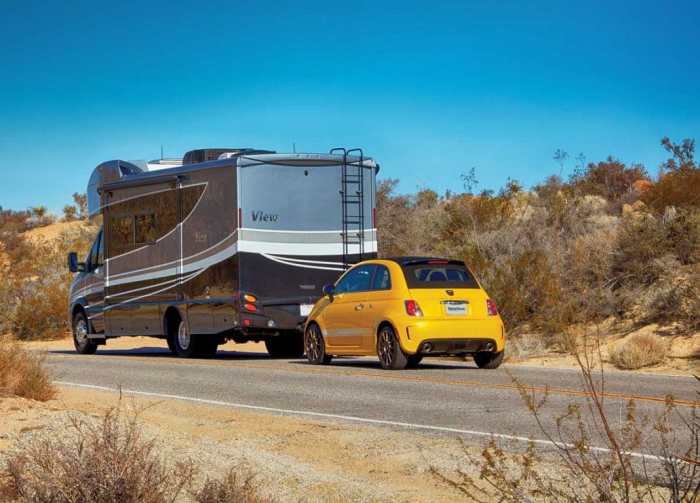
When towing an RV, a reliable braking system is crucial for ensuring safety on the road. The combined weight of the towing vehicle and the RV can put a significant strain on the brakes, making it essential to have a system that can effectively slow down and stop the combination.
One important technology to consider is Anti-lock Braking Systems (ABS). ABS prevents the wheels from locking up during braking, allowing for better control and stability. This is especially beneficial when towing, as it helps to maintain traction and prevent skidding.
Trailer Brake Controllers
Trailer brake controllers are another important component of the braking system when towing an RV. These devices allow the driver to apply the brakes on the RV’s trailer in conjunction with the brakes on the towing vehicle. This helps to distribute the braking force more evenly, reducing the risk of jackknifing or fishtailing.
Hitch and Towing Accessories
Towing RVs requires the right equipment to ensure a safe and stable connection between the tow vehicle and the RV. Various hitches and towing accessories are available, each designed for specific towing needs.
Types of Hitches
Receiver Hitch
The most common type, it consists of a square or round receiver tube mounted on the vehicle’s frame. Hitch balls or other towing accessories can be inserted into the receiver.
Fifth Wheel Hitch
Designed for heavy-duty towing, it mounts in the truck bed and connects to the RV’s fifth wheel coupling.
Gooseneck Hitch
Similar to a fifth wheel hitch, it is mounted in the truck bed but connects to the RV’s gooseneck coupler.
Towing Accessories
Hitch Ball
Connects the tow vehicle to the trailer’s coupler. Choose the appropriate size and weight capacity based on the RV’s weight.
Coupler
Attaches the trailer to the hitch ball. It should match the hitch ball size and be compatible with the trailer’s frame.
Safety Chains
Redundant safety measure in case the coupler fails. They attach the trailer to the tow vehicle’s frame.
Weight Distribution Hitch
Distributes the weight of the trailer evenly across the tow vehicle and trailer axles, improving stability.
Sway Control
Prevents trailer sway by reducing side-to-side movement. It can be built into the hitch or added as an accessory.
Selecting the Right Equipment
Consider the following factors when selecting hitches and towing accessories:
- RV weight and tongue weight
- Towing capacity and payload capacity of the tow vehicle
- Type of hitch and accessories required for the specific RV
- Desired level of stability and safety
Properly selecting and installing these components is crucial for safe and enjoyable RV towing.
Safety Features
Towing RVs involves significant weight and size, making safety features paramount. Advanced safety systems can assist drivers in maintaining control and minimizing risks during towing.
Vehicles equipped with comprehensive safety suites include:
Anti-Lock Braking Systems (ABS)
ABS prevents wheel lock-up during braking, ensuring stability and control, especially on slippery surfaces.
Electronic Stability Control (ESC)
ESC detects and corrects oversteer or understeer, enhancing stability during cornering and preventing rollovers.
Trailer Sway Control (TSC)
TSC monitors trailer movement and applies corrective braking to stabilize the RV and prevent dangerous trailer sway.
Blind Spot Monitoring (BSM)
BSM uses sensors to detect vehicles in blind spots, alerting drivers to potential hazards.
Lane Departure Warning (LDW)
LDW monitors lane markings and warns drivers when the vehicle drifts out of its lane.
Adaptive Cruise Control (ACC)
ACC automatically adjusts vehicle speed to maintain a safe following distance from other vehicles.
Forward Collision Warning (FCW)
FCW alerts drivers to potential collisions by monitoring the distance to vehicles ahead.
Automatic Emergency Braking (AEB)
AEB automatically applies the brakes if an imminent collision is detected.
Comfort and Convenience
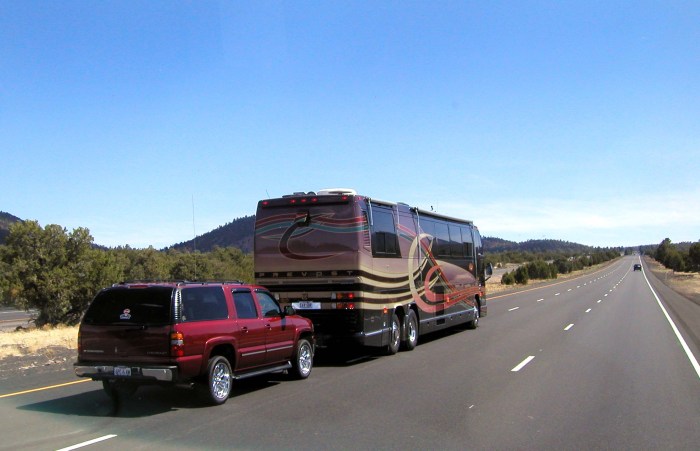
Comfort and convenience features are essential for extended towing trips, as they can reduce fatigue and make the journey more enjoyable. Vehicles that offer comfortable seating, ample storage, and other amenities can make a big difference in the overall towing experience.
Seating Comfort
Comfortable seating is essential for long hours behind the wheel. Look for vehicles with supportive seats that offer good lumbar support and adjustability. Heated and cooled seats can also add to comfort, especially in extreme temperatures.
Storage Space
Ample storage space is crucial for storing all the gear you’ll need for your trip, including luggage, supplies, and towing equipment. Look for vehicles with large cargo areas, under-seat storage compartments, and overhead storage bins.
Other Amenities
Other amenities that can enhance comfort and convenience include:
- A comfortable ride quality to minimize bumps and vibrations.
- A quiet cabin to reduce road noise and distractions.
- A user-friendly infotainment system with navigation and smartphone integration.
- A rear-seat entertainment system to keep passengers occupied on long trips.
Fuel Efficiency
Towing an RV can significantly impact your vehicle’s fuel efficiency. The added weight and drag of the RV increase the engine’s workload, requiring more fuel to maintain speed.To optimize fuel consumption while towing, consider the following tips:
Engine Selection
Choose a vehicle with an engine that has sufficient power and torque to handle the weight of the RV. A larger engine will typically provide better fuel economy than a smaller one when towing.
Driving Habits
Smooth and gradual acceleration and braking can help improve fuel efficiency. Avoid sudden stops and starts, and maintain a steady speed whenever possible.
Tire Pressure
Ensure that your tires are properly inflated according to the manufacturer’s recommendations. Underinflated tires increase rolling resistance, reducing fuel efficiency.
Weight Distribution
Properly distribute the weight of your RV to reduce drag. Place heavier items towards the front of the RV and lighter items towards the rear.
Aerodynamics
Add aerodynamic enhancements to your RV, such as a streamlined front end or side skirts, to reduce wind resistance and improve fuel efficiency.
Cruise Control
Use cruise control on highways to maintain a consistent speed, which can help improve fuel economy.
RV Maintenance
Regularly maintain your RV, including tire rotations, oil changes, and brake inspections. A well-maintained RV will perform more efficiently and use less fuel.
Maintenance and Cost of Ownership
Towing RVs puts additional strain on your vehicle, leading to increased maintenance and repair costs. Regular maintenance is crucial to ensure your vehicle can safely handle the weight and stress of towing. Some vehicles are known for their low maintenance requirements and affordable parts, making them more cost-effective options for RV towing.
Maintenance Considerations, Best cars for towing RVs
Brakes
Towing heavy loads requires more frequent brake inspections and replacements.
Suspension
The weight of the RV can put a strain on the suspension, necessitating regular checkups and potential upgrades.
Engine
Towing can put extra stress on the engine, requiring more frequent oil changes and tune-ups.
Transmission
Towing can increase wear and tear on the transmission, leading to potential repairs or replacements.
Tires
Towing RVs requires tires with higher load capacities and more frequent replacements due to increased wear and tear.
Last Word
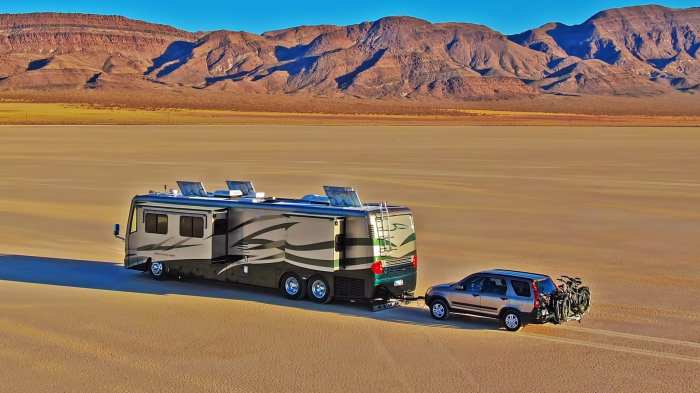
In conclusion, choosing the best car for towing RVs requires careful consideration of towing capacity, payload, engine power, transmission type, frame and suspension, braking system, hitch and towing accessories, safety features, comfort and convenience, fuel efficiency, and maintenance costs. By understanding these factors and researching specific vehicle models, you can find the perfect match for your RV towing needs.
Remember, safety should always be your top priority, so ensure your vehicle is equipped with the necessary features and capabilities to handle the weight and demands of towing an RV.
Clarifying Questions
What is the most important factor to consider when choosing a car for towing an RV?
Towing capacity is the most important factor to consider when choosing a car for towing an RV. It refers to the maximum weight that a vehicle can safely tow.
What is payload capacity and why is it important?
Payload capacity is the amount of weight that a vehicle can carry, including passengers, cargo, and the weight of the RV itself. It’s important to ensure that the payload capacity of your vehicle is sufficient for your RV and its contents.
What engine features are important for towing RVs?
Engine power and torque are crucial for towing RVs. Look for vehicles with engines that offer high horsepower and torque ratings, as these will provide the necessary pulling power for heavy loads.
What type of transmission is best for towing RVs?
Both automatic and manual transmissions can be suitable for towing RVs. Automatic transmissions offer smoother shifting and are generally easier to operate, while manual transmissions provide greater control and can be more efficient for towing heavy loads.
What safety features should I look for in a car for towing RVs?
Important safety features for towing RVs include anti-lock brakes (ABS), trailer brake controllers, electronic stability control (ESC), and airbags. These features help ensure stability, control, and braking performance while towing.